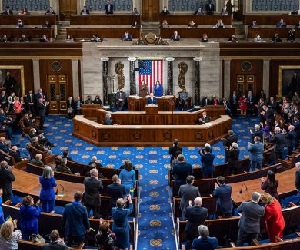 At least 97 current members of the US Senate and House of Representatives reported selling and buying stocks and other financial assets by themselves or their immediate family members in sectors that could be affected by their area of work in Congress, according to an extensive investigation by The New York Times, published in September, which is based on the analysis of trade data from 2019 to 2021.
At least 97 current members of the US Senate and House of Representatives reported selling and buying stocks and other financial assets by themselves or their immediate family members in sectors that could be affected by their area of work in Congress, according to an extensive investigation by The New York Times, published in September, which is based on the analysis of trade data from 2019 to 2021.
Thus, the newspaper’s journalists compared the politicians’ transactions with the work of committees, hearings and congressional investigations to discover possible links between their professional activities and personal investments.
Specifically, it was found that during those three years, 183 current senators or representatives reported transactions with different types of financial assets made by themselves or their family members. More than half of them (that is, 97 congressmen or almost a fifth of Parliament) were part of the congressional committees that could give them inside information about companies, whose shares they bought or sold.
In addition, the 44 most active deputies in the stock market traded in the securities of companies for which their committee assignments could provide them with additional information about the companies.
“Throughout the three-year period, more than 3,700 transactions reported by legislators from both parties raised possible conflicts between their public responsibilities and private finances,” the authors of the publication emphasized.
In this sense, they pointed out that “many of the examples” that they list in their research show “how legislative work and investment decisions can overlap in such a way that, at the very least, they can leave the appearance of a conflict and that sometimes they form a worrying pattern, even if they are technically within the norms.”
Under the so-called ‘Stock Act’ of 2012, members of Congress are allowed to buy and sell stocks, bonds and other financial tools as long as they do not trade insider information or disclose any $1,000 worth of transactions for themselves or their immediate family members. dollars or more within 45 days.
Like everyone else, lawmakers are subject to insider trading laws, but they can get sensitive data at work “on any given day,” meetings, secret briefings, and other events.
The New York Times lists potential conflicts of interest for each of the 97 congressmen listed in the investigation. Among other cases, there is that of Bob Gibbs, a member of the House Oversight Committee, who acquired shares in the pharmaceutical company AbbVie in 2020 and 2021, when his committee was investigating the company and its five rivals over high drug prices.
In addition, Rep. Carol Miller’s husband purchased securities from the same company during the investigation, while Miller also served on Gibbs’s committee. The wife and children of Ro Khanna, another member of the same committee, also acquired or divested AbbVie shares during the review, while also transacting with seven other companies whose work Khanna reviewed.
Meanwhile, lawmaker Alan Lowenthal reported in the financial disclosure statement that his spouse had sold the shares of aerospace giant Boeing on March 5, 2020, one day before the committee in which Lowenthal participated published a report that revealed the failures. of the company that led to the two crashes of the Boeing 737 MAX in October 2018 and March 2019, leaving a total of 346 fatalities.
Among the suspected congressmen, the name of the president of the House of Representatives, Nancy Pelosi, does not appear, since she is not part of any committee. At the same time, her husband Paul Pelosi invests in real estate and technology. Between 2019 and 2021 he reported the sale and purchase of assets worth between 25 million and 81 million dollars.
(Taken from RT in Spanish)